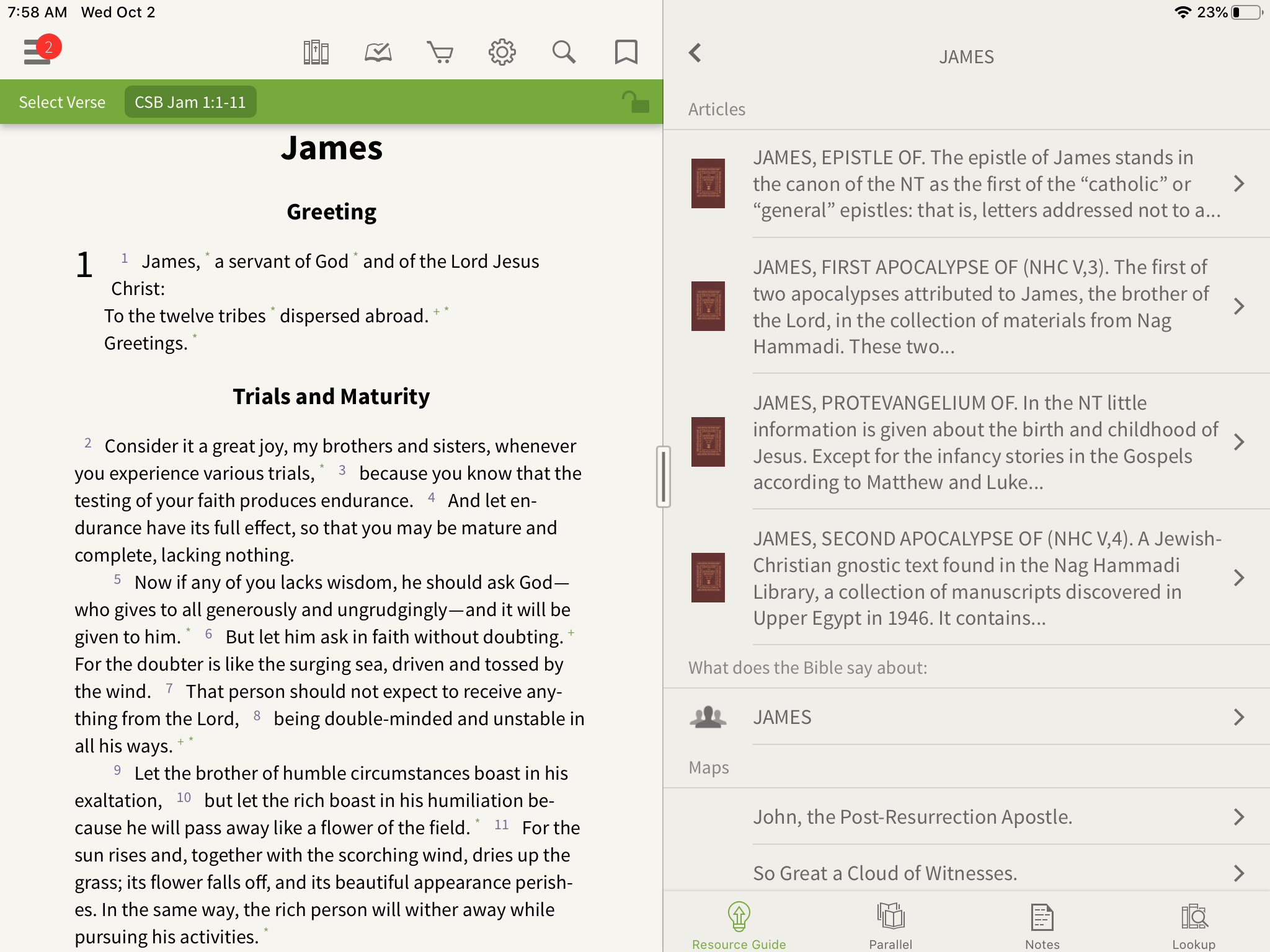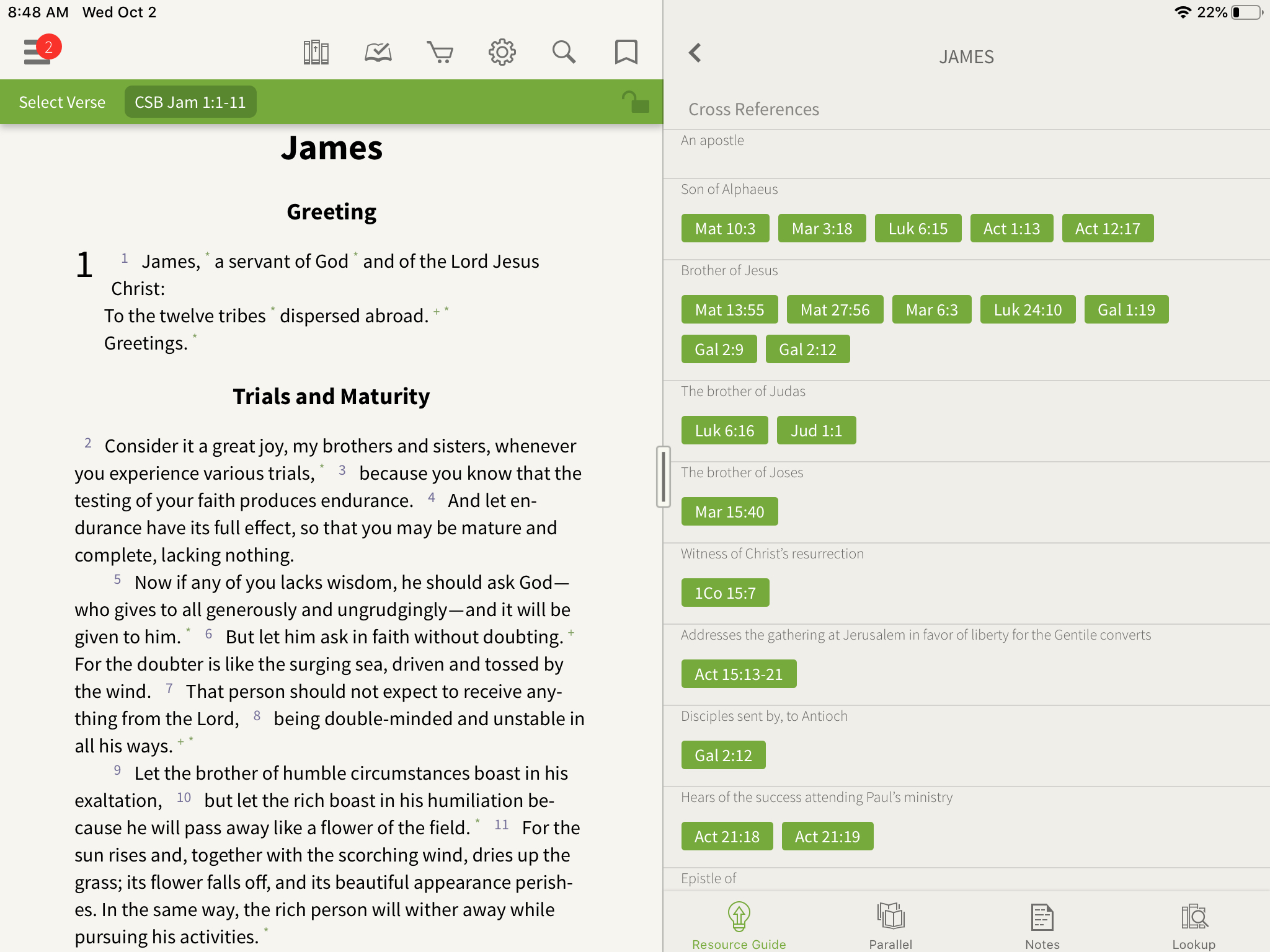James is one of my favorite books in the Bible. I’ve read through it many times, heard it preached, studied it verse-by-verse, wrote a devotional commentary on it, and more. There is so much to explore and learn in this short letter. So, I’m excited that we’re exploring James’ epistle on the Olive Tree blog (See the other posts here). Together, we’re going to learn some fantastic insights from this letter with a character study.
Let’s get started.
Bible Text
The verse we’re focusing on is the very first verse of the letter, which reads:
James, a servant of God and of the Lord Jesus Christ: To the twelve tribes dispersed abroad. Greetings.
James 1:1 (Christian Standard Bible)
As with most New Testament epistles, the writer declares his authorship at the very beginning. The author of this letter is James, who calls himself “a servant of God and of the Lord Jesus Christ.”
Which James? A Character Study
Well, James is a common name in the Bible. Which one is this? Let’s see what we can find in the Olive Tree Bible App to help us.
Thankfully, the Resource Guide makes this work incredibly easy for us. If we scroll down to the “People” section we find a listing for James. Then, if we tap on that, the Resource Guide presents us a list of articles. The article titled “JAMES, EPISTLE OF” in the Anchor Bible Dictionary looks promising.

Here’s what it says about the epistle’s authorship:
Origen refers to the author simply as “James” or “James the apostle” (fr. 126 in Jo.). Eusebius assumes that this James is the one referred to in the NT as “the Lord’s brother” (Gal 1:19), the leader of the church in Jerusalem (Acts 15:13, 21:18), and there is no reason to suppose that Origen thought otherwise, although reference to James as “the brother of the Lord” comes only in Rufinus’s Latin translation of his Commentary on Romans, 4.8. There is no other serious contender among the Jameses of the NT. Jerome, who agonized about the degree of relationship between James and Jesus, identified James of Jerusalem with James the son of Alphaeus (Mark 3:18), whom he also argued was Jesus’ cousin, and this has been widely accepted in Catholic tradition…
Arguments in favor of the traditional authorship include (a) the simplicity of the introduction of “James, a servant of God and of the Lord Jesus Christ” (1:1), which a pseudonymous author might have been expected to embellish; (b) the author’s reverence for “the perfect law, the law of liberty” (1:25, cf. 2:8–12), … (c) some linguistic similarities between the epistle and the speech and letter of James in Acts 15; (d) reference to “the early and the late rain” (5:7), a phenomenon of the Palestinian climate.
Anchor Bible Dictionary
With this information, given the options available, it looks like James, the half-brother of Jesus is the most likely author of this epistle. But, what more can we learn about him?
James, the Half-Brother of Jesus
Instead of turning to another dictionary, let’s see what Scripture has to say about him. Again, the Resource Guide makes this easy for us. In the same section, past the articles, a section called “What does the Bible say about” appears. Tapping it provides a list of relevant Bible passages. If we look at the verses for “Brother of Jesus” we can learn more about him.

Both Matthew (13:55) and Mark (6:3) connect him with Jesus alongside a list of his other siblings, including: Joseph, Simon, and Judas (Jude). In Galatians (1:19; 2:9, 12) Paul writes that this James is an apostle and leader of the church in Jerusalem. Paul also tells us in 1 Corinthians 15:7 that this James was a witness to the resurrection of Jesus Christ. Furthermore, in Acts (15:13-21) we find James leading the church in response to how the Gentiles ought to live according to the gospel, as well as another encounter with Paul where he listens to reports of Paul’s ministry to the Gentiles (Acts 21:18, 19). We also learn from other places in Scripture, like John 7:3-5, that Jesus’ brothers, James included, were not believers during the time of his earthly ministry.
All this information gives us a pretty solid picture of who James was as a person:
- He grew up with Jesus
- Doubted his brother’s claim to be the Messiah but still followed him
- Witnessed the resurrection
- Became an apostle and leader of the church in Jerusalem
- Authored the epistle that bears his name
What Can We Learn from James?
When it comes to learning from the life of James, the brother of Jesus, there is one thing that stands out above the rest, and it is this: the resurrected Christ has the power to change lives. Like the religious leaders of their day, James had seen Jesus perform countless miracles, but none of that convinced him that Jesus was the Messiah (John 7:5). But when he witnessed the resurrected Jesus his entire life changed. He went from skeptic to believer to church leader.
It’s amazing to see the same work that happened in the life of James happen in our own lives. One moment we’re dead in our sins with no faith in who Jesus is. Upon witnessing the resurrected Christ through gospel proclamation, the Holy Spirit makes us alive and our lives are never the same.
Character Studies Help Us Go Deeper
It is this James, the James who went from unbelief to belief, that pens this beautiful epistle to Jews who have been scattered abroad because of persecution for their belief in the risen Savior. If you’re like me, knowing this background gives you a greater appreciation for the author of this letter, and makes me want to pay attention to his words all the more.
And to think, we got all this information from a couple clicks in the Olive Tree Bible App. What else could we learn if we dug a little deeper. Open up your Bible to James and look around the Resource Guide to see what other information you can learn about our Lord’s brother.
Interested in learning more about character studies and the Anchor Bible Dictionary?
Other Posts on James
A Word Study Example in James 2
Finding Godly Wisdom in James 3
Writing Your Own Bible Outlines: James 4
Strength to Endure: Journaling on James 5




0 Comments